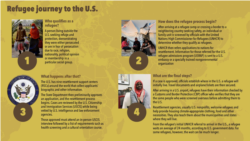President Joe Biden’s first month in office has seen a flurry of executive orders reshaping U.S. immigration policy, including a rebooting and expansion of America’s refugee program.
But experts and resettlement groups tell VOA it will take time and resources to reverse the Trump administration’s cutbacks in refugee resettlement that pared admissions to their lowest levels in decades.
Starting in October, the United States is set to welcome up to 125,000 refugees a year, up from a 15,000 limit at the end of the Trump administration. The announcement could change the lives of people like Abdirizak Noor Ibrahim.
Originally from Somalia, Ibrahim fled war-torn Mogadishu in 2004 and became a refugee in Nairobi, Kenya. He and his family were approved to travel to the U.S. for resettlement in early 2017, just as Donald Trump launched his presidency and signed proclamations restricting travel from several majority Muslim countries, including Somalia.
“When I heard that people like me and other Muslims were banned from entering the U.S., I felt so bad, and I was heartbroken. But nothing I could do about it,” Ibrahim told VOA. “It was a decision that was beyond me. So, since then, I stayed here. But now, I am so hopeful since there is a change of administrations, I will be accepted and taken to the country.”
While some proponents of Trump’s restrictive immigration policies have expressed wariness over Biden’s announcement expanding refugee resettlements, refugee advocates say his goals cannot be reached by simply raising the admissions cap.
Christopher Boian, senior communications officer at the U.N. High Commissioner for Refugees, said another monumental hurdle to helping refugees is the coronavirus.
“There will be a number of challenges, including on the funding level, on the staffing level, on just getting these processes up and going again. But arguably the biggest, or one of the biggest, challenges at the moment to getting that program back to the robust levels that the U.S. administration has said it would like to see is the COVID pandemic,” he said.
Time to rebuild
Faith-based groups that assist the U.S. government in its refugee resettlement program said rebuilding the program will not happen overnight.
Krish O’Mara Vignarajah, CEO of the Lutheran Immigration and Refugee Service (LIRS), said LIRS has begun rebuilding at the local level.
“So, that is rehiring staff that were lost over the last four years because of firings and furloughs. Part of it is working with local, state and federal governments to renew the certifications for the offices that had closed to allow them to restart,” she said.
The refugee ceiling is the maximum number of refugees who can be resettled in the United States each year.
According to Yael Schacher, senior U.S. advocate at Refugee International, over 35,000 refugees had been approved by United States Citizenship and Immigration Services (USCIS) as of December 2020.
“Though a much smaller number — closer to 1,000 — were ready to depart,” she added.
The president sets the refugee ceiling before the beginning of the fiscal year in October. He sends the plans for congressional review. According to the U.S. State Department, about 11,814 refugees arrived in the United States in fiscal year 2020.
Schacher said resettlement was not the only thing that slowed down in the last four years.
“People who are resettled in the United States already, who came as refugees, have the ability to apply to have their family members to resettle as refugees, as well. (But) the process of doing that got extremely slow under the Trump administration,” she said.
Alicia Wrenn, senior director of resettlement and integration at HIAS, one of the nine nonprofits that help resettle refugees in the U.S., said HIAS is once again ramping up a network of partners to help newly arrived refugees. She noted it is highly specialized work.
“They have the language skills to work with clients. They have the cultural sensitivity, the trauma awareness that really is required in refugee services,” she said.
Vetting
Backers of Trump’s immigration agenda warn against undoing policies they view as going the extra step to ensure America’s safety by taking in fewer refugees and subjecting the remainder to more rigorous background checks and security vetting.
Lora Ries, senior research fellow at the conservative Washington-based Heritage Foundation, said there was a review of the vetting program at the beginning of the Trump administration that should be repeated by successive administrations, not discarded.
“It should not be thrown out [by the new administration] just because Trump's name was attached to it,” she told VOA.
Biden’s executive order includes a request for the Department of Homeland Security (DHS) secretary to “consider” ways to “expand refugee vetting and adjudication capacity,” including “permitting the use of video and audio teleconferencing to conduct refugee interviews and establishing the necessary infrastructure to do so.”
Vignarajah said she expects refugee vetting to remain thorough, adding that refugees fall into a low-security risk category.
“There is this claim, which isn't actually true that refugees are potentially criminals or terrorists. The truth is that a refugee is far less likely to commit any sort of crime than a native born American. And yet, what we see, or we saw with the Trump administration, was additional layers of vetting were added, some of which had no credence or rationale behind them,” she said.
A Morning Consult/Politico survey, conducted earlier this month among 1,986 registered voters, shows three in five Republicans “strongly oppose” raising the refugee cap to 125,000, while 61% of Democratic voters support the expansion, including 33% who “strongly support” it.
While the Biden administration reboots America’s refugee program, Ibrahim hopes living in limbo will soon be over.
“I would love to go and settle in another country to leave the life of uncertainty that I have lived with here (in Nairobi) for so many years, and live a better life,” he said.
Mohammed Yusuf contributed to this article from Nairobi






